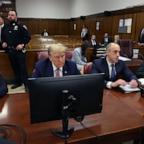PolarTREC Lets Teachers Instruct From Poles
Teachers explore the ice with researchers and scientists, teaching online.
June 13, 2008 — -- It's hot out there. Gas is expensive. There are plenty of reasons to be grumpy about our world. But below the headlines, there is great reason for optimism stemming from incredible opportunities — brought to you through the magic of technology — to better understand the challenges we face.
One of these is PolarTREC. Funded by the National Science Foundation and managed by the Arctic Research Consortium, the program allows teachers to participate in polar research, working closely with scientists. The goal is to improve science education.
These trips are part of a "global scientific campaign to advance our understanding of the polar regions" and involve teachers embedded in the field with researchers, to explore the regions' native environments, cultures, history and science.
Think about that for a second: a chance for elementary school teachers to spend two to six weeks of their summers working at one of the poles, with full-time exploring researchers. Can you remember a teacher from your elementary school days who inspired you in a particular topic, in no small part because you could just feel his or her enthusiasm? What better way to inspire kids and to make faraway places seem local than to send a teacher along to gather and share, in real time, his or her firsthand experiences?
Make no mistake; this program isn't about a "what I did on my summer vacation" project. Throughout the journey, program participants relay calls and videos back stateside via the Internet so that kids (or anyone else) can follow along as events and research unfold. Even more powerfully, the teachers on these trips converse with anyone with Internet access via trip-specific message boards, engaging students even when classrooms are closed.
This learning is not a one-way adventure. Scientists are all too aware that American kids are behind in math and sciences and know that to reverse that trend, we'll have to find effective ways to spark their curiosity early and often. In addition to teaching kids about ice caps and the lives of researchers who work on them, these scientists will be watching how the students learn, charting what grabs their attention. Through daily interaction, the scientists seek to understand how to most effectively share discoveries and inspire the next generation of adventurous learners.




